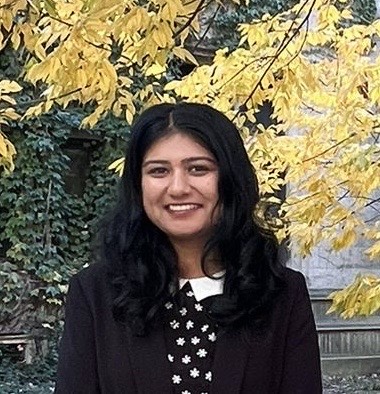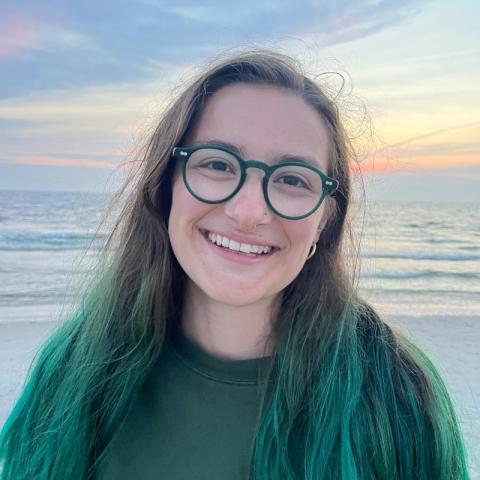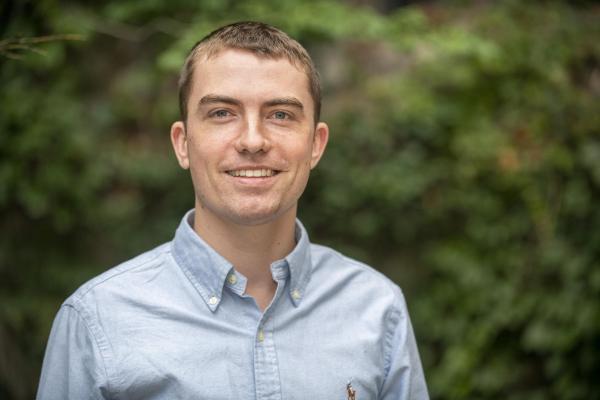In Brief
The Pozen Graduate Lectureship awards doctoral candidates funding to develop and teach courses that connect with human rights themes.
New lecturer courses this spring will explore disability justice, human rights journalism, and the relationship between gender, sexuality, and medicine.
Lecturers get valuable experience with engaged students from across the disciplines; students benefit from direct connection with a new generation of up-and-coming scholars.
- Apply by March 23.
Every UChicago doctoral candidate with an eye on the academic job market knows the value of having a course you designed and taught yourself on your CV. But with graduate students often tapped to teach and TA existing courses with already-developed syllabi, these opportunities can be hard to come by.
Pozen Center Graduate Lectureships offer a rare solution, giving up to three advanced doctoral students per year the funding to create and teach a class that connects their subject-area expertise to human rights issues. Applications are open and will be accepted through March 23.
These lectureships further the Pozen mission of nurturing a new generation of human rights scholars. They also help ensure that our human rights majors, minors, and all UChicago students have access to courses that consider the human rights tradition from a broad range of disciplinary perspectives.
NEW LECTURERS PREPARE COURSES FOR SPRING
This year’s graduate lecturers include students from the Law School, the Committee on Social Thought, and Sociology. Their courses, to be offered in Spring Quarter, will cover disability justice, the relationship between human rights discourse and journalism, and the relationship between gender, sexuality, medical institutions, and health outcomes.
For Malavika Parthasarathy of the Law School, the journey to the lectureship began with the experience of being the TA for the renowned “Health and Human Rights” course co-taught by Pozen Faculty Board Member Renslow Sherer and Evan Lyon, two pioneers in the application of the human rights lens to medical care in the Chicagoland area and beyond.
“The course really changed the way I look at the world, and made me think a lot more about how to apply academic concepts to improving people’s lives,” Parthasarathy recalls. She started seeking out more Pozen events, where she felt increasingly inspired to think about how scholarly ideas about disability could be applied in the world. When she learned about the lectureship, she knew she had to apply.
Parthasarathy has long been interested in the disconnect between how disabilities are defined in both the legal world (where biological definitions dominate) and within the newer field of disability studies, which tends to view disabilities as a product of how societies are (and aren’t) set up. Her course, “Discussing Disability,” will explore both traditions. “The goal won’t be to pinpoint one perfectly neat definition of disability,” she says. “Instead, we’ll be using the history of these approaches as a way to talk about our visions for a better future.”
Graduate lecturer Theodora Hurley’s course, “Gender, Sexuality, and Medicine,” will also look at how the practice of medicine always involves situating biological knowledge within social and political contexts. Topics considered will include the medicalization of homosexuality, the regulation of reproduction, the feminist health movement, intersex and gender-affirming medical practices, and abortion.
She applied for the lectureship in large part because of her excitement to work with the types of undergraduates who are drawn to human rights courses. “It’s exciting to know I will be working with students who are coming from so many disciplines,” she says. “It creates opportunities for everyone in the classroom to learn from each other, in a time when the concept of human rights is going to be mobilized a lot in political conversations.”
Matthew Zipf’s lectureship is, like Parthasarathy’s, an outgrowth of previous engagement with the Pozen Center. In 2022, he received a Pozen Doctoral Research Grant to support his study of the New Yorker journalist, novelist, and lawyer Renata Adler, focusing on the relationship of her life and work to human rights discourse. Zipf’s grant allowed him to visit the New York Public Library to view Adler’s papers held there, looking for information of relevance to an unpublished collection of photojournalism about the Civil Rights Era co-curated by Adler and two Yale Law professors.
His Pozen course, “The History of Human Rights in Journalism,” will continue in this vein. Students will read the work of Adler and other journalists—including Ida B. Wells, Joan Didion, and writers for radical newspapers like The Liberator and The Masses—to examine the intertwined histories of journalism and human rights.
“We’re going to ask how ideas about human rights changed journalists’ approaches, and vice versa,” says Zipf. Along with Adler, he looks forward to introducing students to George Washington Williams, a veteran of the Civil War who went on to document the brutal abuses inflicted by the Belgian empire on Congo.
PAST LECTURERS REFLECT ON TAKEAWAYS
Looking back, last year’s graduate lecturers noted how enriching the experience had been.
Kate Petroff, a philosopher, taught a class on philosophical debates about the right to leisure."Working with undergraduates who were interested in thinking about the real-world implications of philosophical ideas,” she said, has continued to inform her approach to “making political philosophy feel engaging and relevant in the classroom.”
“My lectureship was the most rewarding teaching experience I’ve had,” says historian Syrus Jin, who designed a course that traced the influence of human rights discourse on American warfare in the 20th century. “I was able to experiment with content, course structure, assignments, and leadership in meaningful ways, and had the privilege of working with a group of remarkable students. It defined the kinds of teaching that I wish to do for the rest of my academic career.”



